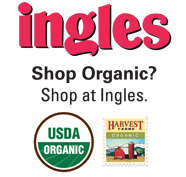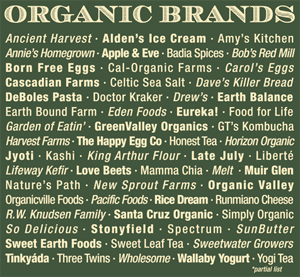Organic
The Ingles Advantage

With thousands of USDA certified organic products and our own USDA certified organic store brand Harvest Farms, Ingles Markets is THE place to find a large and affordable selection of the organic products you are looking for.
What is Organic?
Organic foods sold in our stores are products that carry the USDA labels which have been certified as such and meet the USDA standards. Produce that earns the USDA organic certification is grown with no synthetic pesticides (any pesticides must be approved by National Organic Program and derived from natural sources), synthetic fertilizers, sewage sludge, bio-engineering or ionizing radiation. In order to be labeled "organic," the farm where the food is grown is certified to make certain the farmer is following all the rules necessary to meet USDA organic standards. Companies that handle or process organic food before it arrives in our stores must be certified, too.
Ingles carries a wide variety of organic products throughout the store.
To know if your food is certified as organic, you should look for a small sticker with the USDA Organic Seal on the product or on the display of the product. Products with this seal must contain at least 95% organic products by weight to meet the specifications for being organic.
What Do the Various Organic Food Labels Mean?
Single-ingredient foods, such as vegetables and pieces of fruit, carry the USDA Organic label either as a sticker or on the sign above the bin. Meat, cartons of milk or eggs, cheese earn the organics label if they are grown or produced on organic-certified farms. The USDA Organics label means that these foods are at least 95% organic.

What Requirements Must Be Met to Have the USDA Organic Seal and/or Organic Claim?
The product must be overseen by the USDA National Organic Program and produced without genetic engineering, ionizing radiation, and sewage sludge. A product must contain at least 95% organic ingredients (excluding water and salt). If an ingredient is non-organic, it must be specified on a National List of Allowed and Prohibited Substances. Organic ingredients must be identified (e.g. organic dill) or via asterisk or other mark.
For foods with more than one ingredient, the labels differ:
1. Foods with 100% organic ingredients are labeled "100% Organic"
2. Foods that contain 95-100% organic ingredients are labeled "Organic"
3. Processed foods that contain at least 70% organic ingredients can use the phrase "Made with organic ingredients" and list up to three of the organic ingredients on the display panel
Processed foods with less than 70% organic ingredients cannot use the term organic anywhere on the main display panel, but may identify the specific ingredients that are organically produced in the ingredients statement
Look for the name and address of the government-approved certifier on all packaged products that contain at least 70% ingredients
What's the Difference Between Natural and Organic?
Only food labeled "organic" has been certified as meeting USDA organic standards. The term "natural" means that a food product is basically free of artificial and synthetic ingredients and for meat and poultry, the products are also minimally processed. Claims such as "free-range", "pasture-raised", "cage-free" or "no hormones administered" may appear on food labels but do not mean the food is USDA organic.
Get More Information
Learn more about the USDA organic standards at www.ams.usda.gov/nop or call the National Organic Program at 202-720-3252. You can also write them at USDA-AMS-TM-NOP, Room 4008 S. Bldg., Ag Stop 0268, 1400 Independence, SW, Washington DC 20250.








